Aura Identity Theft Protection Review
 Aliza Vigderman, Senior Editor, Industry Analyst
&
Aliza Vigderman, Senior Editor, Industry Analyst
&
 Gabe Turner, Chief Editor
Last Updated on Jun 27, 2024
Gabe Turner, Chief Editor
Last Updated on Jun 27, 2024
What We Like
- All-around protection: Aura’s all-inclusive plans provide identity, personal information, credit, and device protection all in one.
- Customizable: Aura’s identity protection can be tailored to the user. For example, for parents, family plans provide access to parental control software so they can better protect their children from identity theft.
- Customer support: Aura can be reached via phone and live chat 24/7 for any concerns about billing, accounts, and identity restoration.
What We Don't Like
- No cheaper options: Since Aura plans are all-inclusive, there are no cheaper options for those looking for just identity or credit protection.
- Apps are difficult to navigate: Aura offers lots of features, especially in the digital security space. It includes a VPN, antivirus software, parental control software, and more. Some of those require different apps, making Aura harder to manage than other identity protection services.
Bottom Line
Aura is a top-notch service that provides protection for multiple vulnerable areas, including identity, credit, and digital. It’s a feature-rich service that offers affordable, all-inclusive subscriptions, but that can make it a bit harder to navigate and learn to use especially if you’re new to identity protection services.Few identity protection services pack as many protections as Aura in its subscriptions. No matter which plan you go with, Aura gives you identity and credit monitoring, antivirus software, and a VPN, in addition to your typical identity theft insurance and professional restoration services. Having tested over a dozen ID theft protection services, we know those features typically only come with upper-tier subscriptions. But with Aura, we gained access to all of them with the $12-per-month entry-level plan.
That makes Aura an affordable option for identity protection, but does it protect users enough? We put it to the test by signing up for an Individual plan and living with it for a whole month. In that time, we found out that it’s an effective identity protection service with a lot of safety nets. We also learned that it’s not perfect. There are catches you should know before signing up. Ultimately, we gave it a 9.6 score out of 10 – the highest of all identity protection services we tested. Find out why in this Aura review.
Overall Rating
- Criminal and court records monitoring
- Monthly credit scores
- $1 million identity theft insurance reimbursement maximum
Aura Identity Theft Protection Features
Identity theft is a growing problem; it has been for some time. In 2017, the FTC received only about 370,000 reports of identity theft. Five years later, that figure shot up to 1.4 million.1
If you ask us, one of the main reasons for the rapid growth of identity theft is the fact that it has gone digital. Identity thieves now use the internet to gather as much personal data as they can. And they’re using some innovative techniques, too, from phishing to social engineering tactics. They also use hacking, malware, and data security breaches.
Aura, it seems, has been keeping up with the times. A quick look at the service tells us that it covers three key areas of identity protection:
- Protection of personal information
- Protection from credit fraud
- Protection from digital threats
What exactly do these protections entail? To answer that, let’s dive right into our experience with Aura.
Identity Theft Protection
Aura helped keep our sensitive information hidden from fraudsters. That sounds simple, but in order to do it, Aura monitors millions (if not billions) of data points where stolen information might appear. That includes dark web forums, data broker sites, online marketplaces, and even online records.
Aura’s identity protection is not limited to the digital world. It’s also always keeping track of records outside the internet like court and public records, sex offender lists, home ownership records, and more.
Aura’s identity protection is more reactive than preventative, which means it doesn’t stop criminals from stealing your identity; it simply lets you know at the first sign your identity was stolen. We’re going to discuss Aura’s more preventative measures in a bit, but for now, it’s important to note that identity theft can still happen even if you have Aura on your side. That’s why we like that Aura also includes identity theft insurance coverage in its set of identity protection features. The insurance covers stolen funds and legal expenses amounting to up to $1 million for each user.
Here’s a closer look at all of Aura’s identity protections in place.
- Personal information and ID monitoring: We don’t want our personally identifiable information, such as ID numbers, floating around the internet. Aura notified us if this registered information fell into the wrong hands.
- Social Security and ID authentication monitoring: Aura monitored the internet to see if anyone used our Social Security numbers or conducted a transaction with our identities (e.g., opening a new bank account).
- Online account monitoring: Aura seemed to be the first to know of any breaches to our online accounts or passwords. (Psst — here are some tips for creating a strong password.)
- $1 million insurance coverage: In 2020, people reported losing a total of $3.3 billion to fraud, with a median loss of $311. Aura also includes as a benefit identity theft insurance which covers up to $1 million for eligible losses from identity theft, the industry-standard maximum. Aura’s policy goes beyond legal fees to cover wage losses, CPA costs, child care, and more.
- Home title and address monitoring: Aura ensured no one stole our identities by forwarding our mail. We’re not homeowners, but if someone tries to transfer your home title into their name, you’re covered.
- Auto title monitoring: Similar to home title monitoring, Aura can secure your car ownership title with this feature. Additionally, Aura partnered with auto dealers nationwide. Partner dealers can extend free one-year Aura memberships to customers, with an option to extend the service past the one-year mark for as low as $5 per month.
- Criminal and court records monitoring: Individuals charged with crimes can use our names to impersonate us. Yikes! The good news is that Aura would notify us if our information turned up in criminal or court records.
» Learn more: List of our best identity theft protection providers.
Credit and Fraud Protection
The next part of Aura’s service is credit and fraud protection, which again, takes a reactive approach. This time, Aura protects users from the consequences of credit fraud by monitoring credit accounts with the three major bureaus. It also helps prevent financial loss by keeping track of personal finances, from bank accounts to investment accounts. Credit protection covers a wide scope, but these were the highlights during our tests.
- Credit monitoring: Aura alerted us to new inquiries on our credit file (like new credit cards or bank loans) across the three major bureaus — Experian, Equifax, and TransUnion. Aura claims to send fraud alerts up to four times faster than its competition.
- Monthly credit score updates: We received monthly updates on our VantageScore credit score, which helped us keep track of our credit worthiness and spot inconsistencies. For example, if your score drops without you taking out new loans or missing payments, that could indicate someone’s using your credit file. Monthly score updates from Aura were fine, but see our list of the best credit protection services if that’s a priority. It’s possible to receive updates weekly.
- Credit lock: Locking your credit file is a nifty way to prevent credit fraud, and Aura helped us do it. There’s only one caveat: Aura locked our Experian credit file, but not our TransUnion and Equifax files. If someone applied for a fraudulent loan in our name, and the lender pulled our credit file from someone other than Experian, the lock would have been useless. We recommend locking your credit file with TransUnion and Equifax separately, even with the Experian credit lock from Aura.
- Financial fraud monitoring: We linked our financial accounts (including credit cards, bank accounts, and investment accounts) and set alerts for unusual spending activity. Stopping financial fraud is a race against time; the sooner you can report unusual activity, the sooner you can put a stop to unauthorized spending.
- Bank account monitoring: Sometimes more is merrier, but not when it comes to names on our bank accounts. Aura alerted us if someone attempted to add more account holders or remove our names from existing bank accounts. That helped protect us from account takeover fraud.
- Annual credit report: Lastly, we were able to retrieve a copy of our credit reports from the three reporting bureaus thanks to Aura. It’s worth noting that getting credit reports is free, whether or not you’re an Aura user. Check our guide on how to get a free copy of your credit report for more information.
Device and Network Protection
Most of the identity and credit protection features involve monitoring, which is reactive. With device and network protection, Aura becomes proactive, which means it can actually protect your personal information from getting stolen rather than just alert you after the fact.
Aura subscriptions include digital protection tools that you can use to lock down your digital data and prevent identity theft through malware, hacking, and trackers. Here’s what you’ll get.
- Antivirus: Did you know that there are over 677 million known malware programs, and over 350,000 are discovered each day?2 Scary stuff. What’s more, some types of malware are designed specifically to steal sensitive information, like account passwords and personal files. Thankfully, Aura’s antivirus protection scanned, detected, and isolated threats for removal.
- VPN: Aura’s VPN protected our internet connection with military-grade encryption to hide our activity from cybercriminals. And if you’re thinking, “What does an identity protection brand know about VPNs?”, well, Aura actually owns a number of VPN services, like the Hotspot Shield VPN we tested. Protecting your identity is all about staying private, and with a VPN, you can hide your browsing activity, encrypt your traffic, and stay anonymous.
- Safe Browsing: Visiting malicious websites is another leading cause of online identity theft, and with the Safe Browsing extension, Aura prevents you from entering questionable sites that could endanger your identity. Some of the sites Aura blocked for us were phishing sites, which are sites known to contain malware.
- Password manager: Our online accounts contain sensitive information, from personal information to payment information. Aura locks those up by generating strong passwords and securely storing passwords using encryption. Aura’s password manager worked across all our devices, from desktops and laptops to tablets and smartphones.
- Smart Vault: In addition to a password manager, Aura offers Smart Vault, an encrypted file storage that lets you store sensitive and important files and share them with your trusted contacts. Each adult member of all Aura plans gets 1 GB of secure storage. We used ours to store sensitive work files and digital companies of important paperworks.
- Anti-Track and Ad Blocker: Websites use trackers to see what you’re up to online – the websites you visit, items you purchase, shows you watch, and more – and use the information they gather to profile you. While they generally don’t get personal information from trackers, it’s a good idea to block those to prevent them from being used to target you with ads.
- Email Alias: Data breaches have been a problem for the past few years, and to keep your email address from being included in databases of scammers, Aura can generate an email alias for you so you can hide your real email address and protect it from data breaches. This is similar to Surfshark’s Alternative ID feature, which we tested when we got a Surfshark One subscription.
That’s a long list of digital protections, but we’ve noticed that a lot of those features are also available from most of the antivirus software we’ve tested. So here’s the question: Is it worth getting those features from an identity theft protection service when you can get them from real antivirus providers?
That depends. From a practicality standpoint, it makes sense to use a bundled package like Aura if you don’t have antivirus software and those features yet. But if you’re already getting those features from your antivirus provider, there are cheaper identity protection options than Aura that don’t include those features. For example, Identity Guard’s subscriptions start at $7.50 per month (almost $5 less than Aura’s Individual plan).
That said, we believe Aura’s antivirus software and other digital protection tools are great. Aura actually gets its technology from VPN and antivirus companies under its umbrella. Bitdefender and Kaspersky are among the antivirus companies associated with Aura, and those antivirus providers are nothing to sneeze at. Both are in our list of the best antivirus software of 2024.
Parental Controls
Lastly, and exclusively for family plan subscribers, Aura offers parental control and monitoring features that can help parents protect their children from identity theft and other online dangers.
FYI: Here’s why you need parental control software, even if your kids don’t want it. Spoiler: Parental control software does more than just limit their screen time.
Aura offers a portfolio of useful digital tools to help parents better protect their children from identity theft and other online dangers. Parental control features are courtesy of the Circle app, a parental control app now under the Aura umbrella. Additionally, the Aura app now comes with ProtectMe software features from Kidas, which offers cyberbullying and online predator protection features.
- Device management: Parents can check and monitor their children’s devices remotely. This includes tracking their location.
- Content filtering and blocking: Parents can also set up content filters to prevent their kids from accessing age inappropriate things on the internet.
- Screen time limits: Through the Circle app, parents can limit how much time their kids spend in front of their phones. Once the limit is reached, the app will lock the kids’ smartphones.
- Internet usage tracking: Parents will also be able to monitor their kids’ online activities by gaining access to browsing histories. And if they use the internet a little too much, you can pause their internet (but not yours) through the parental control app.
- Cyberbullying and online predator protection: With the help of ProtectMe, Aura enables parents to monitor their children’s interactions in online video games to better protect them from cyberbullying and online predators. According to cyberbullying statistics, online harassment and bullying happens way more often than most parents think, so it’s incredibly important that parents are aware of such problems even if cyberbullying doesn’t directly link to identity theft.
With the help of these features, parents can better protect their children from identity theft, not to mention instill healthy online habits that they can take with them as they grow up.
These parental control features are timely additions to Aura’s family plans, especially since the family plans don’t offer as much protection to children as to adults. Giving your kids extra protection in the form of parental controls can go a long way in keeping them safe from identity theft, not to mention, other online dangers like cyberbullying and online predators.
Where Does Aura Look For Leaks?
When Aura says it’s “monitoring” the web for unusual activity related to identity, where is it actually looking? Well, it’s a very long list. It’s looking at data broker sites, the dark web, public and criminal records, USPS address change records, and so on. We can’t list them all here, but here are some key areas Aura monitors both for its identity and credit monitoring.
- New account records, like a new credit card or utility account. Identity thieves often use stolen personal information to open new accounts for financial gain.
- The internet is a vast space, and Aura monitors the dark web for any signs of compromised identities. For instance, Aura will notify you if someone else is using your online account, whether it’s your email, social network, or online shopping account.
- Sites on the dark web. If your information is part of a data breach, it may appear on the dark web. That doesn’t sound good! Fortunately, Aura monitored dark web sites, forums, and chatrooms for our info.
- Public records, such as criminal and court records, home title deeds, and licensing records. For example, if a criminal has stolen your identity and got an arrest warrant with your information, Aura will let you know. Criminals sometimes use other people’s identity to evade arrest, and it’s actually one of the hardest types of identity theft to resolve because it involves a long legal proces.
- Data broker lists have profiles of millions of people that they sell to advertisers, telemarketers, people search sites, and more. If you’ve gotten spam and robocalls before, there’s a good chance that your contact information is in a data broker list. Aura monitors those lists, and if your data appears on them, it will let you know so you can request its removal.
Aura’s features offer in-depth identity theft protection. The device and network protection offerings are a particularly nice bonus.
But what’s it actually like to use the product? We tested it out to see.
The Aura Experience
We like services that offer a good user experience, especially identity protection services. They are pretty much set-and-forget, but from time to time, you’d need to update information or manage alerts. To do that conveniently, you’d want a dashboard that is easy to use.
Aura offers a clean desktop dashboard where we managed our alerts, credit score updates, transactions, identity monitoring watchlist, antivirus protection, and VPN.
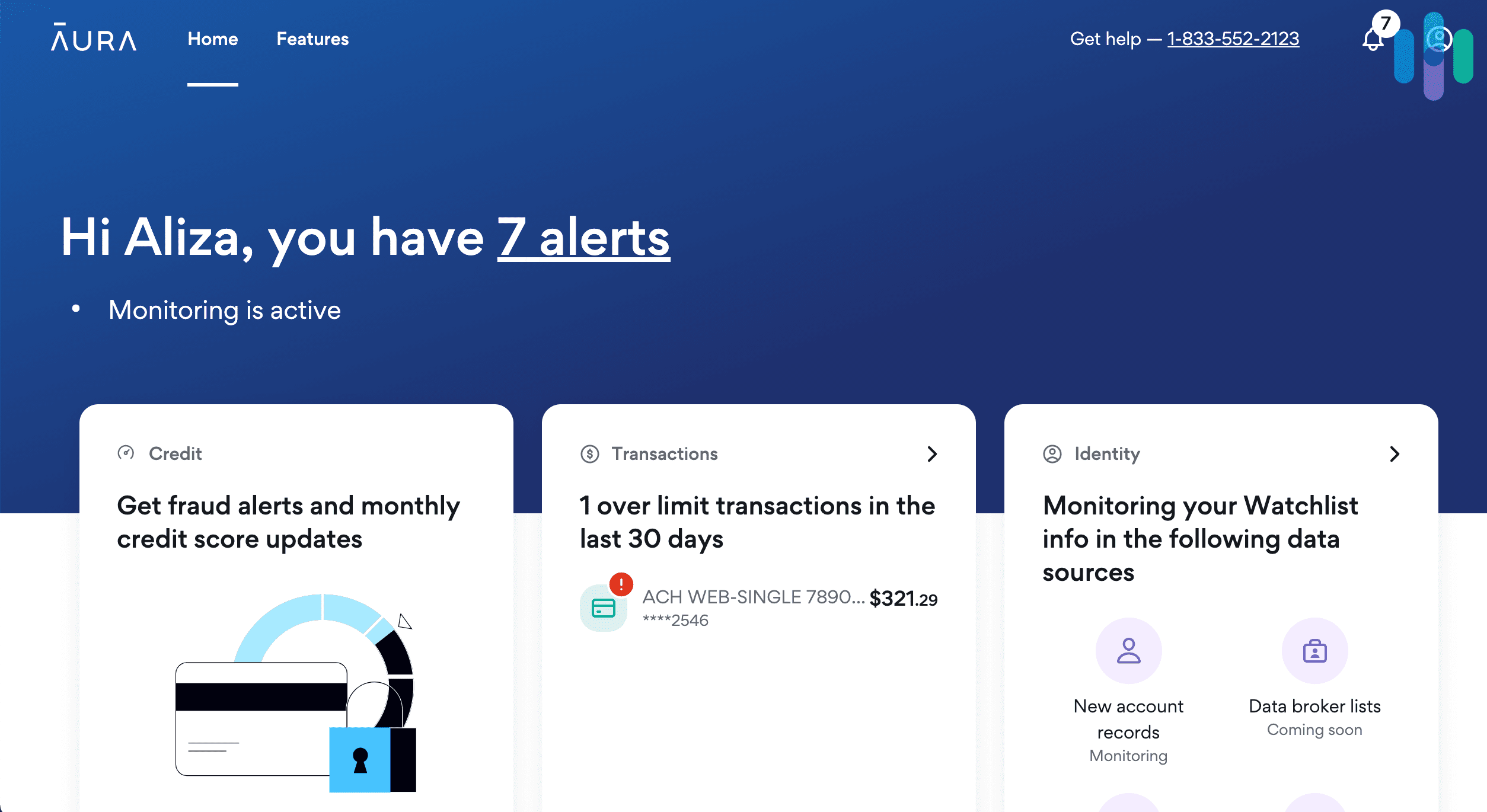
We customized our watchlist to track a bunch of different personal information:
- Credit and debit cards
- Birthdate
- Driver’s license number
- Email addresses
- Financial account numbers
- Health insurance IDs
- Address
- Passport numbers
- Phone numbers
- Social Security number
- State ID number
- Loyalty cards
Note that for the digital protection features, you’ll use a separate app that offers both antivirus software and a VPN. The VPN features are available for Windows, macOS, iOS, and Android users, while the antivirus is available for Windows, macOS, and Android. The antivirus is not available on iOS, but given that iPhones and iPads don’t need antivirus as much as other systems, Aura’s lack of antivirus software for iOS is just fine.
That said, if you’re looking for standalone antivirus software, check out our best antivirus for Mac, best antivirus for Windows, and best antivirus for Android.
Using the Aura App
Since our main focus is the Aura identity protection service, we went ahead and downloaded the main Aura app.
Downloading and logging in to the app was straightforward, with no cumbersome tutorials or instructions. Once we logged on, we set up Touch ID, a form of multi-factor authentication on iOS, for quick and secure access. In our settings, we customized how much time can elapse before we need to reauthenticate.
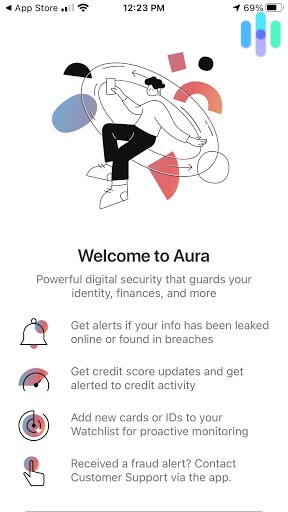
It was super easy to connect our financial accounts. To start, we selected our bank and entered our credentials directly in the app. Aura uses Plaid to connect our accounts. Other major financial apps, like Venmo and Robinhood, also use Plaid, so we know it’s secure.
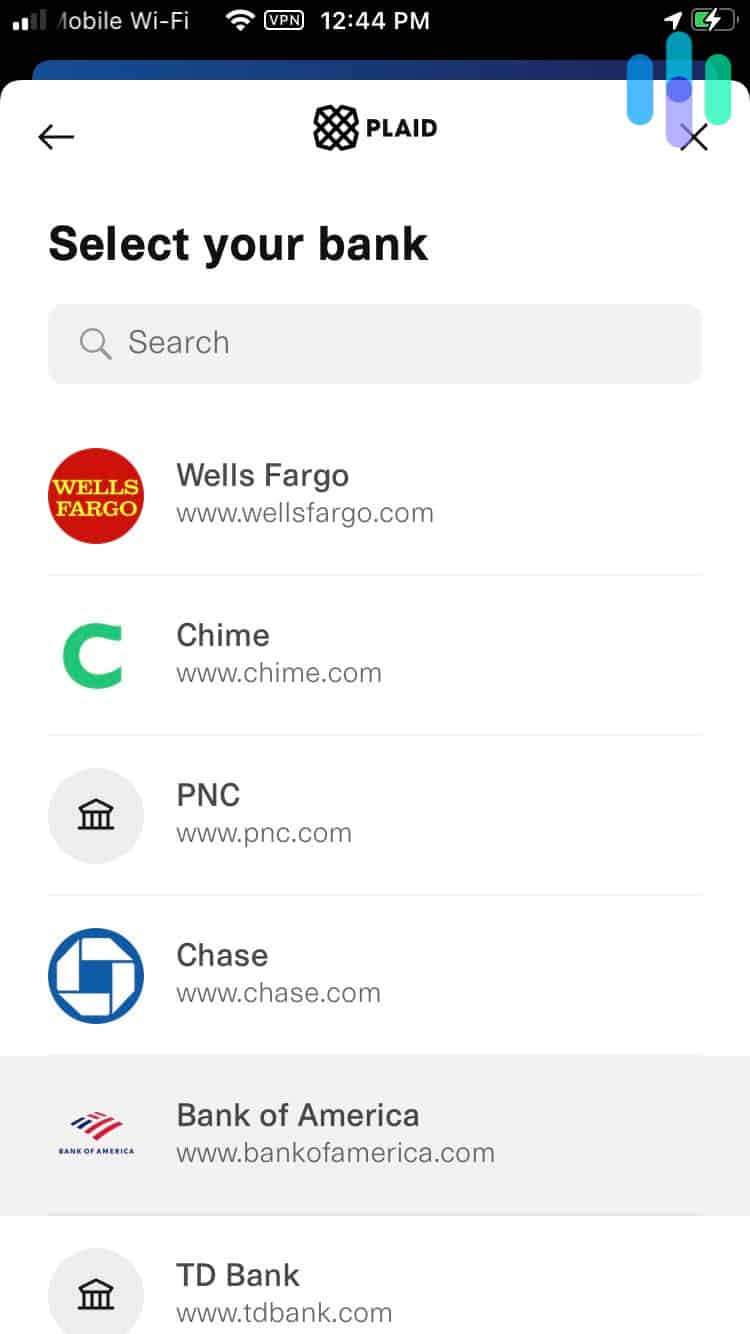
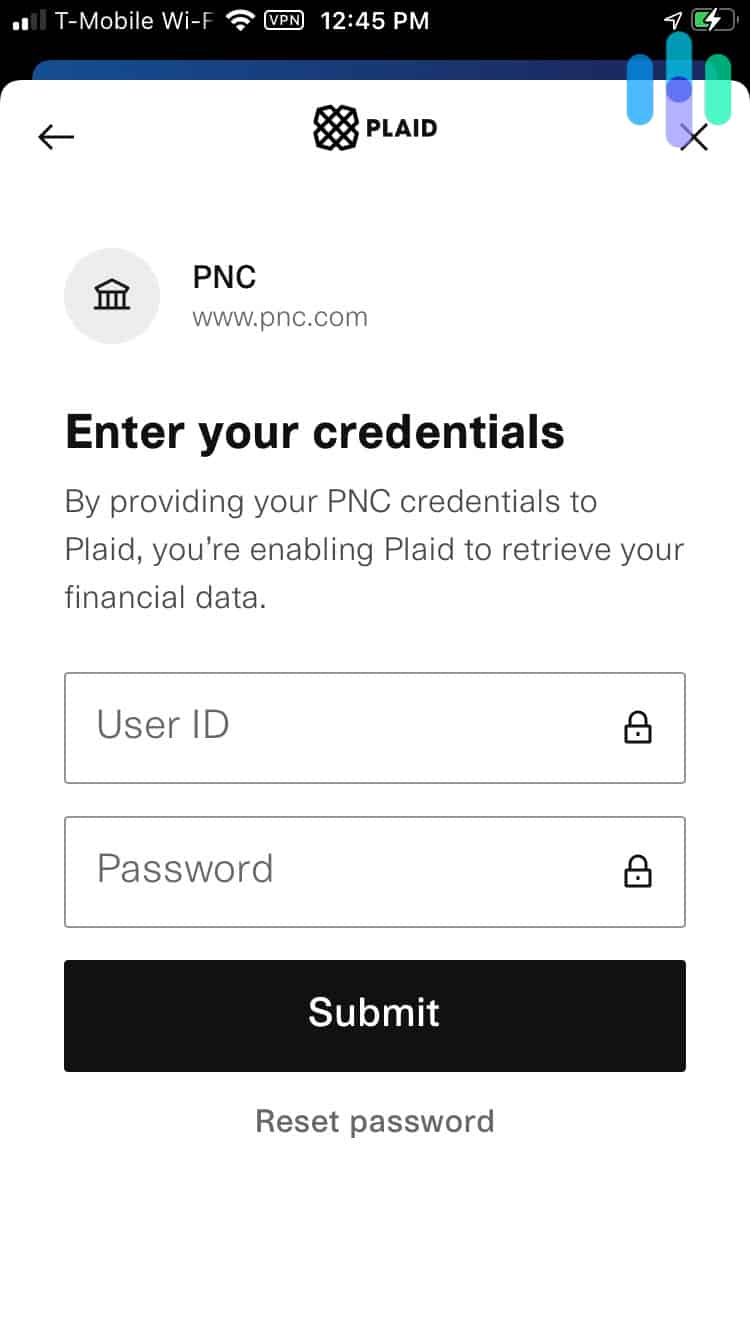
From there, we set alert thresholds for our different account types (bank accounts, credit cards, loans, investments, and others) so that Aura would alert us to certain activity outside the norm. Aura’s transaction-monitoring feature let us know of any large purchases, withdrawals, or balance transfers.
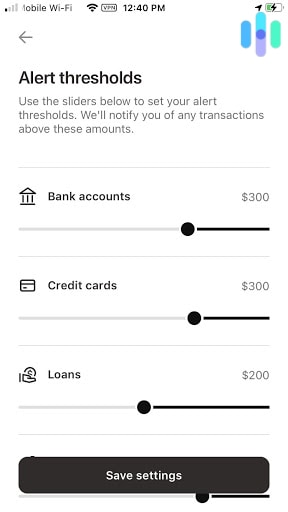
TIP: Customize your alert thresholds for different accounts so that Aura notifies you only when necessary.
Next, it was time to secure our Wi-Fi network. This took just a few seconds! With a single tap, we secured our connection (and turned off the feature when we wanted).
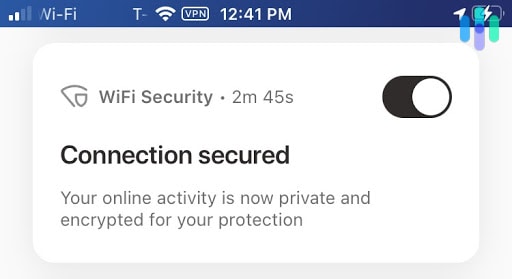
Aura’s Wi-Fi Security uses a virtual private network (VPN), allowing us to browse privately without worrying about hackers. This was useful when we connected to public networks, like a coffee shop’s Wi-Fi.
Note for Chromebook users: Aura’s apps are yet to become available to Chromebook users. You can still use Aura and monitor your dashboard via the web login, but you won’t have access to the antivirus and VPN. If you’re interested in securing your Chromebook, check out the best VPNs for Chrome.
Overall, the Aura app was well designed and simple to use on our iPhones. Other Apple customers likely agree, as the app has a four-star rating. And while we didn’t test the Android version of the app, its three-star rating shows that it’s not terrible.
Aura Privacy
Like any identity theft protection service, Aura collects some data about us — our account information, billing and payment info, identity verification information, and communications with the company.
It also collects information about how we use its services. While Aura won’t collect our precise GPS location without telling us, it may get an approximate location in order to provide certain services, like connecting us to the closest VPN server.
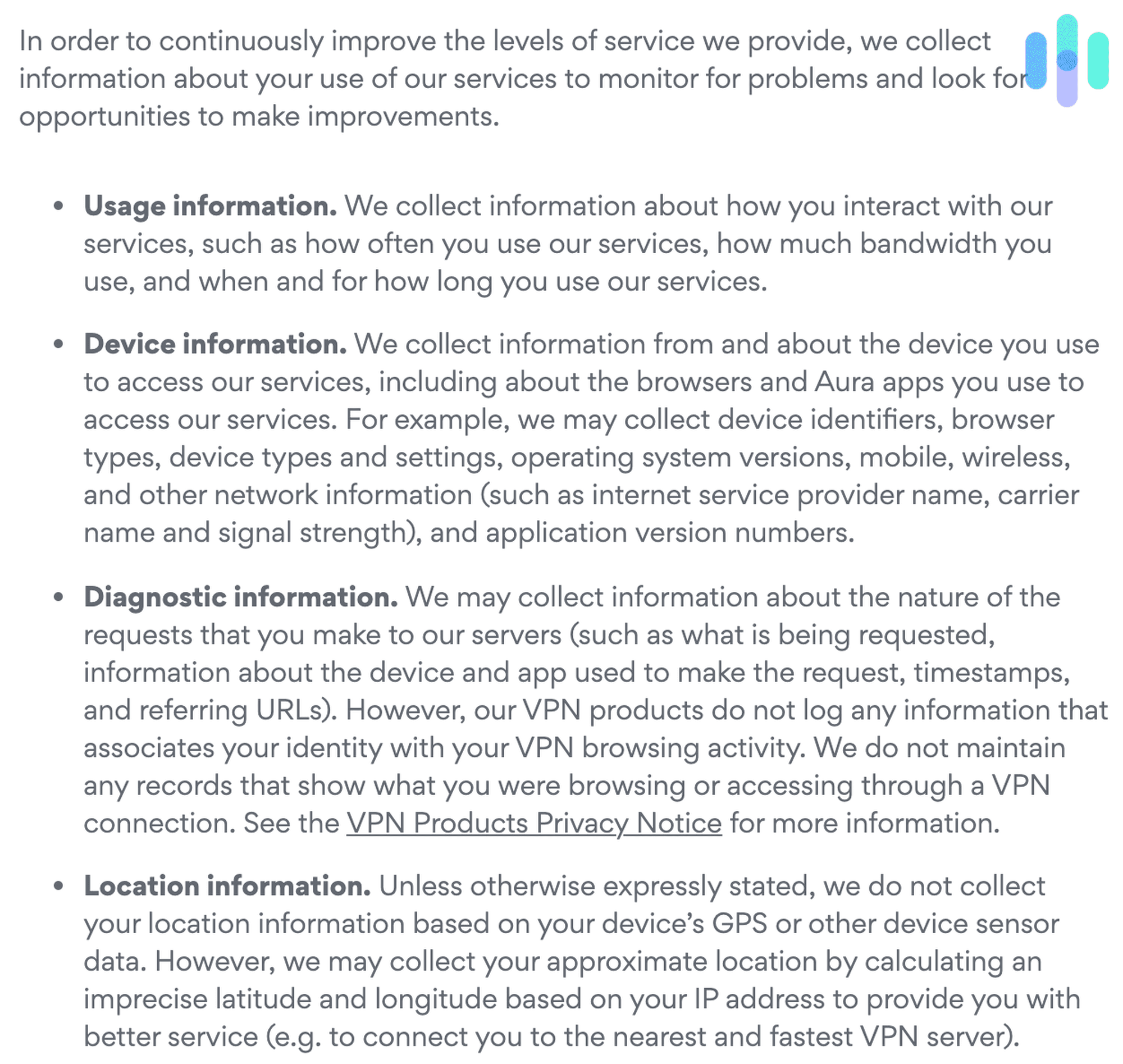
With that much information about us, we were glad that Aura used 256-bit AES to secure our data from breaches and hackers. That’s the highest encryption standard available today, and it’s used by major banks and the military, so we’re confident in Aura’s data security.
Unfortunately, since Aura also offers a VPN as a part of its service, there’s some concern about the company being located in the United States. The US is part of the Five Eyes alliance, which is an alliance of nations with policies that allow government agencies to legally obtain customer data from companies within their jurisdictions.
Of course, the government will not just ask for data willy-nilly. It has to be court-approved and only under extremely unlikely circumstances, like when there’s the threat of terrorism or to assist in a criminal investigation.
Another thing that should put your mind at ease is that even though Aura may be subpoenaed to provide information, its VPN itself doesn’t collect any data that can be tied back to you and your browsing activity. It doesn’t log your IP address, for example, nor does it record the websites that you visit. In VPN terms, this is called a “no-logs” policy, and it ensures the privacy of customers especially when a VPN company is located within the United States and other Five Eyes, Nine Eyes, and 14 Eyes countries.
Aura Customer Support and Insurance
Aura offers all customers 24/7 support by phone and email. The company encouraged us to call its support team with any questions, or if it detected identity theft or fraud. Aura’s agents have an average of over seven years of experience, so we felt like we were in good hands.
With the Ultimate plan, we also received one-on-one support with white-glove remediation. In the event of identity theft, an Aura case manager will work with us to craft a recovery plan and help us navigate credit bureaus and federal institutions.
Finally, Aura’s identity theft insurance offers up to $1 million in coverage** of not only legal fees but also a number of other eligible losses. These include lost wages, private investigator fees, accountant fees, and even child care you need while dealing with identity theft.
Aura Subscription Options
Aura pricing plans and subscriptions are available in three tiers: Individual, Couple, and Family. As their name implies, the tier best suited for you depends on whether you’re a single individual, a part of a couple, or a part of a family.
In terms of features, there’s not much variation between the Individual and Couple plans. Basically, just take whatever the Individual plan offers and double it.
The family plan offers the most value. It protects up to five adults, each of whom will enjoy all the features of the Individual plan. In addition, though, the family plan includes child SSN monitoring to protect any children in the family. There’s no limit to the number of children you can provide this protection to, as long they live with you.
The family plan also offers digital safety features not included in either the Individual or Couple plan. These features are oriented towards families. There’s the parental control software, for example, that allows parents to monitor and manage how their children use the internet and their devices. There’s also cyberbullying and online predator protection embedded into Aura’s app.
Here’s a closer look at each subscription plan.
| Features and pricing | Individual | Couple | Family |
|---|---|---|---|
| Monthly pricing | $15 | $29 | $50 |
| Yearly pricing | $144 | $264 | $444 |
| Online account monitoring | Yes | Yes | Yes |
| Personal info and SSN monitoring | Yes | Yes | Yes |
| Removal of info from data brokers | Yes | Yes | Yes |
| Identity verification monitoring | Yes | Yes | Yes |
| Home title monitoring | Yes | Yes | Yes |
| Criminal and court record monitoring | Yes | Yes | Yes |
| Lost wallet remediation | Yes | Yes | Yes |
| Credit monitoring | Yes | Yes | Yes |
| Credit lock | Yes | Yes | Yes |
| Bank account monitoring | Yes | Yes | Yes |
| Financial transaction monitoring | Yes | Yes | Yes |
| Investment monitoring | Yes | Yes | Yes |
| Monthly credit score updates | Yes | Yes | Yes |
| Annual credit reports | Yes | Yes | Yes |
| Parental controls | No | No | Yes |
| Child SSN monitoring | No | No | Yes |
| Identity theft insurance | Up to $1,000,000 | Up to $1,000,000 per adult member | Up to $1,000,000 per adult member |
| Fraud resolution | Yes | Yes | Yes |
| Antivirus | Up to 10 devices | Up to 10 devices per adult member | Up to 10 devices per adult member |
| VPN | Up to 10 devices | Up to 10 devices per adult member | Up to 10 devices per adult member |
| Safe Browsing | Up to 10 devices | Up to 10 devices per adult member | Up to 10 devices per adult member |
Price-wise, Aura’s family plan costs are above the industry average, but again, it offers more than what a typical family identity protection plan provides. Of course, if you might not need all those extra features. If you’re looking for a leaner but more affordable option, you should look into Identity Guard family coverage. Identity Guard’s family plans protect as many members of the family as Aura, but with fewer features.
GOOD TO KNOW: Aura refunds annual membership plans within 60 days of purchase, so you can test the waters before diving in. You can cancel over the phone by calling 1-855-712-0021 or through your account dashboard.
Bottom Line
If you’re interested in Aura, here are the key points to consider.
Consider Aura if you …
- Are looking for an all-in-one identity theft protection that monitors a number of data sources and transactions.
- Want identity theft insurance that covers you for up to $1 million** for eligible losses.
- Value antivirus and a VPN, at home and on the go.
- Would like to add up to five adult members to your plan.
- Are looking for a password manager, VPN, antivirus, and parental control features
Reconsider Aura if you …
- Are looking for basic identity protection that is affordable. Aura plans start at $12 per month for individuals, which is on the higher end compared to basic protections from other companies that cost less than $8 per month.
- Already have antivirus software or a VPN of your own, as you can likely save money by choosing a service that excludes those features.
With Aura, we feel like all of our bases are covered. Still in the market for a service to protect your identity in real time? Look no further than our identity theft protection guide that will help answer more in-depth questions.
Insurance Information Institute. (2021). Facts + Statistics: Identity theft and cybercrime.
iii.org/fact-statistic/facts-statistics-identity-theft-and-cybercrimeAV-TEST. Security Report 2019-2020. av-test.org/fileadmin/pdf/security_report/AV-TEST_Security_Report_2019-2020.pdf
